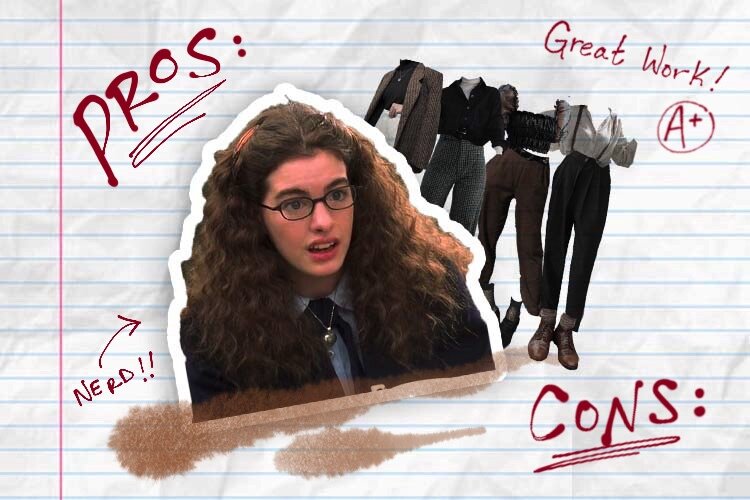The Upsides and the Downsides of Being a Nerd
Graphic by Sadd Sadd. Images via Insider and Pinterest.
In third grade, I wore thick-framed glasses and always raised my hand first in class. I dressed up as Hermione Granger à la “Harry Potter” for Halloween each year and constantly projected myself onto Velma Dinkley when watching “Scooby-Doo.” I wanted to read constantly, and my bookshelf reflected my ravenous appetite for new hardcovers and paperbacks.
Famous television “nerds.” Image via Sporcle.
When I was young, I wanted to be a nerd. My younger self would be proud, because I can now say I am a nerd in many ways. I wait in lines to get limited editions at bookstores, I love sci-fi movie franchises with a passion, and I can always be seen with a pen and paper. But where did the trope of a nerd or geek come from, and why do I now feel ashamed yet proud to be one?
According to the Oxford English Dictionary, the word “nerd” made its first appearance in the publication Newsweek in 1951, referring to a nerd as someone who would be a “drip” or a “square.” Since then, “nerd” has grown in popular usage to refer to an intelligent individual who may have a highly technical interest in certain subjects or fanatic domains.
In some ways, being nerdy can be trendy. Fashion and social media trends related to academia have shown how commonly the nerd is portrayed in the media. On platforms like TikTok, trending topics like “dark academia” show that Gen Z is obsessed with the aesthetic of academia and intelligence.
An academic can be a cool academic in this way; trends like these have popularized fashion statements like blazers, turtlenecks and loafers while also encouraging followers to strive for intelligence. Other aesthetic categories like light academia, royalcore and more encourage a culture that rewards expressing your smartness in a visually pleasing way.
A typical dark academia aesthetic board showing the fashion, hobbies and accessories of a dark academic. Image via Pinterest.
An example of a royalcore aesthetic collage. Image via Pinterest.
There are upsides to being nerdy in today’s society, but not every type of nerd is rewarded. Popular depictions of nerds in movies and television shows are often negative, spouting facts, outsmarting their peers and being socially distant.
Princess Mia’s before and after shots from “The Princess Diaries.” Image via Insider.
As a plot device, the female nerd often removes her glasses and suddenly becomes the most gorgeous ingenue, creating a transformation that leaves audiences wondering why they didn’t see her beauty all along. I remember watching “The Princess Diaries” when I was eight years old and having the iconic princess makeover scene burned into my memory. I wondered if I would be more liked and attractive if I took my glasses off and changed my personality.
Growing up, I was bullied for how much I loved “Harry Potter.” I would carry a wand with me to school each day because it brought me joy, but these muggles called me geeky and did not appreciate my obsession with the book series. I didn’t understand why being nerdy in this way was a bad thing, and I still don’t.
Chewbacca and I at Disneyland, of course.
Today, I am still questioned for liking things like the Marvel Cinematic Universe, Disney and “Star Wars.” In my early teens, I never wanted to be open about what I love because I fear being labeled as nerdy, but over the years through loving different franchises or obsessing over various book series, I have learned that if something makes me happy, I should run with it.
The two sides to being nerdy today greatly juxtapose one another. On social media, trends like dark academia paint being nerdy and intelligent as a thing of great beauty, while movies and television paint nerds as reclusive and obsessed with their fandoms in an ostracizing way.
Neither of the two are mutually exclusive; instead, they are malleable and can be combined in different ways. I wear academic skirts and always carry a journal, yet I was watching a superhero movie just the other night. For me, I define a nerd as someone who is unafraid to demonstrate their intelligence and passions. Thinking of the word in this new light, I am proud to be a nerd and would not blame anyone else for feeling the same.






